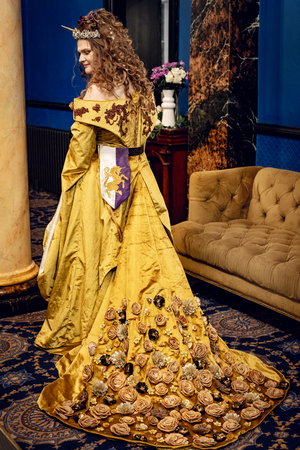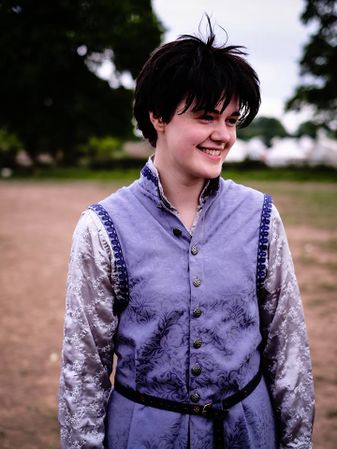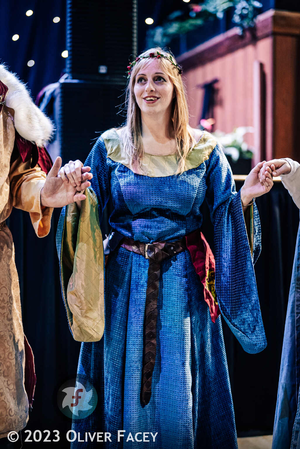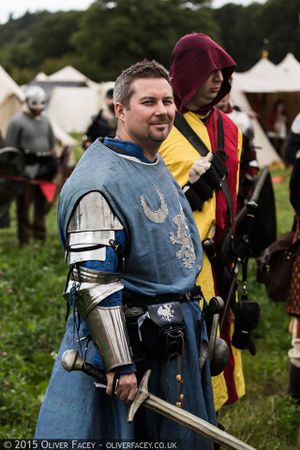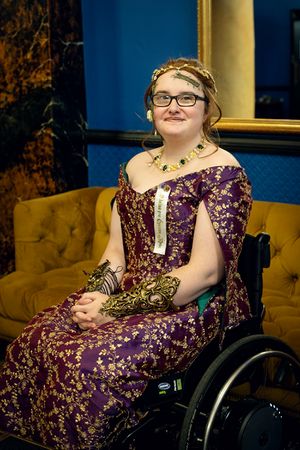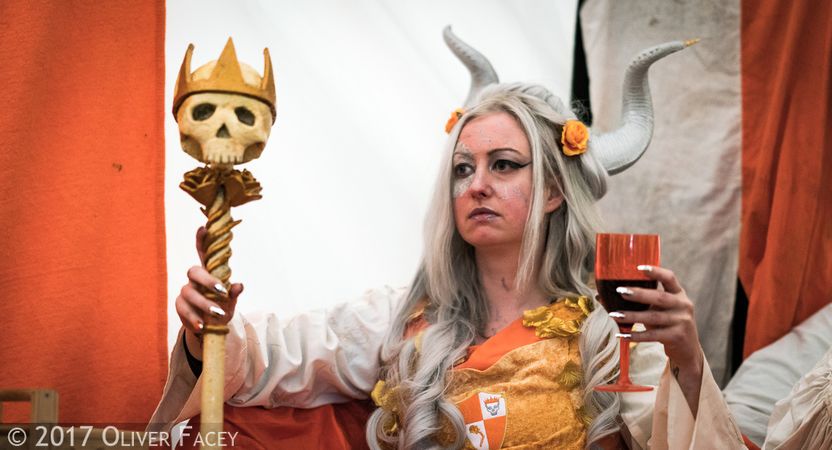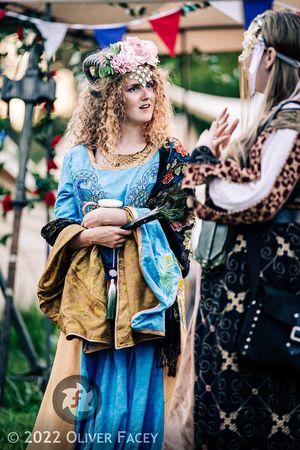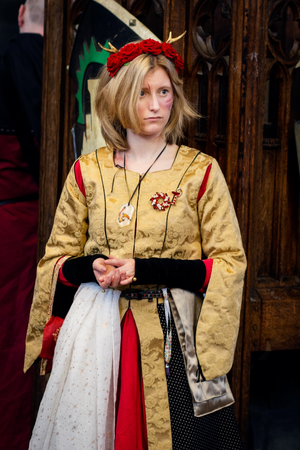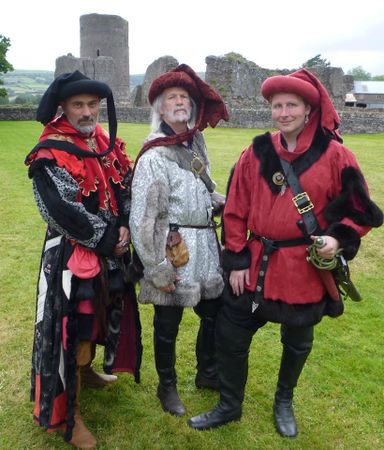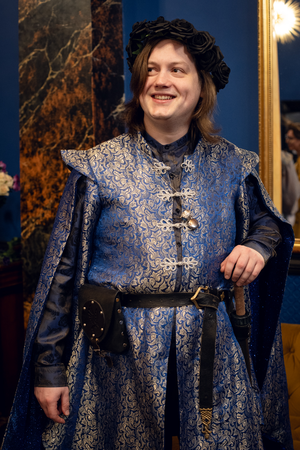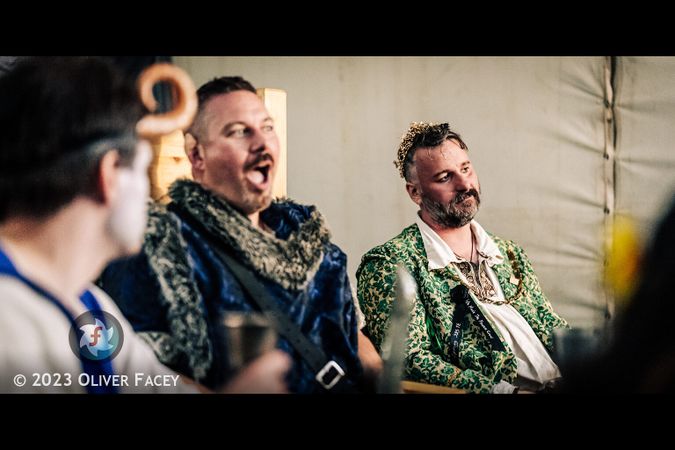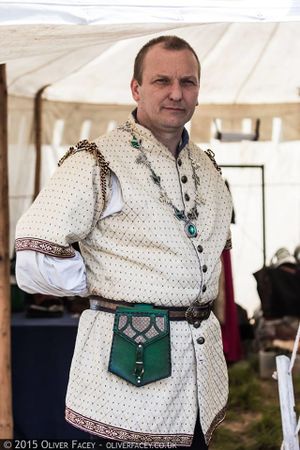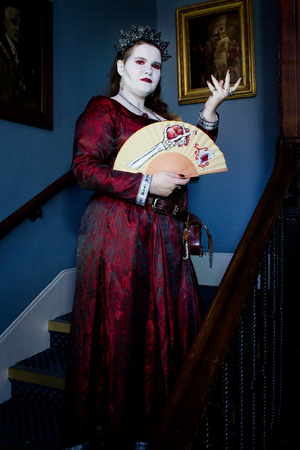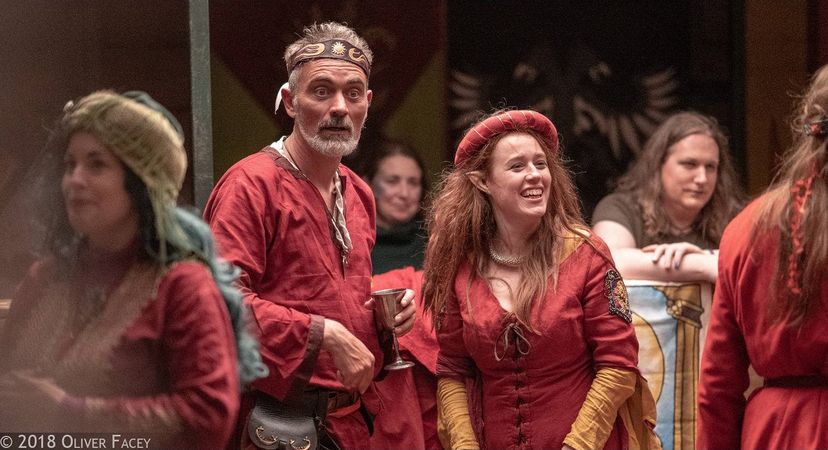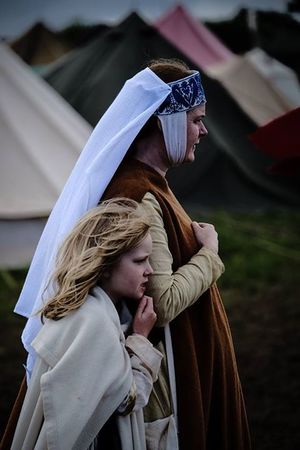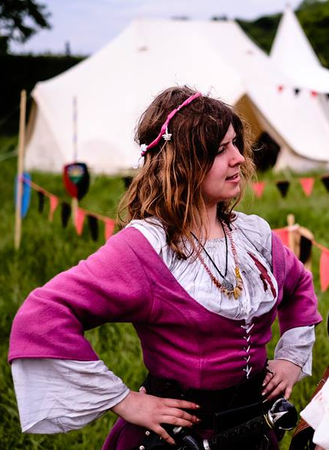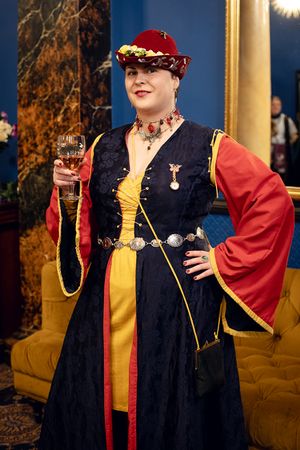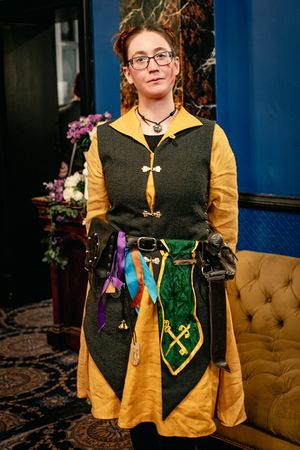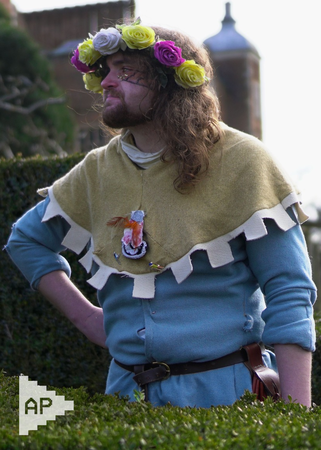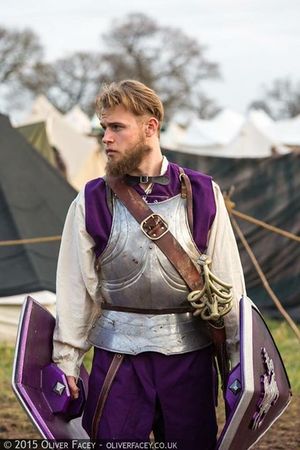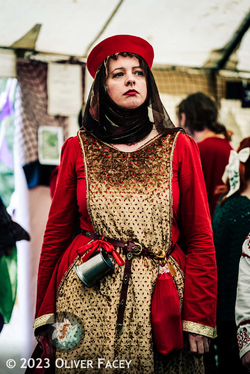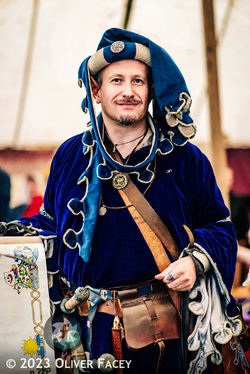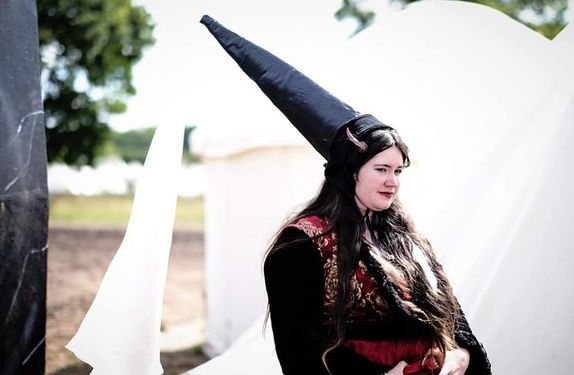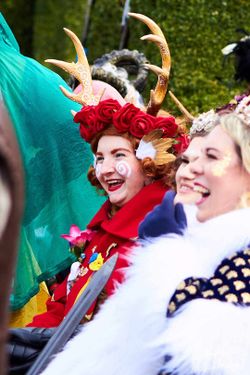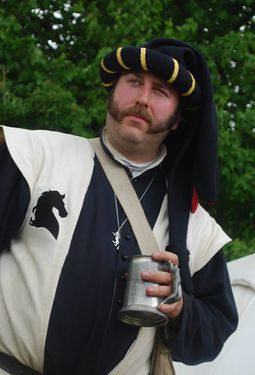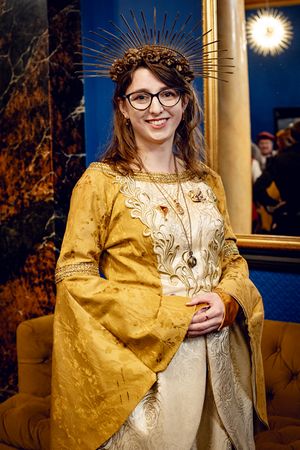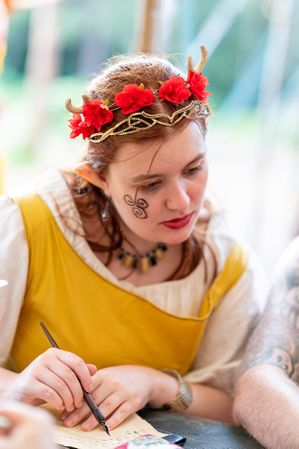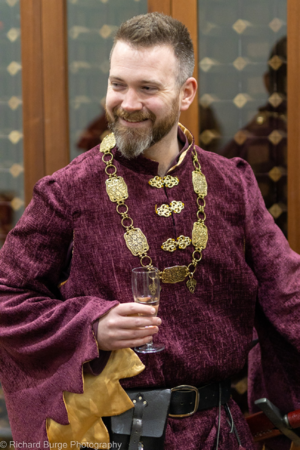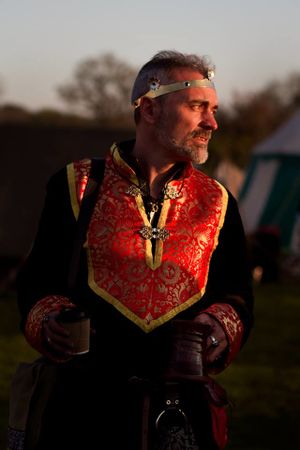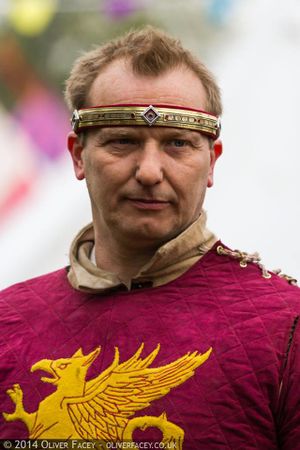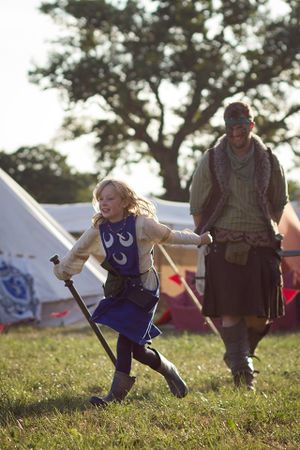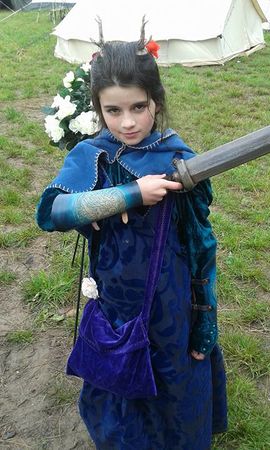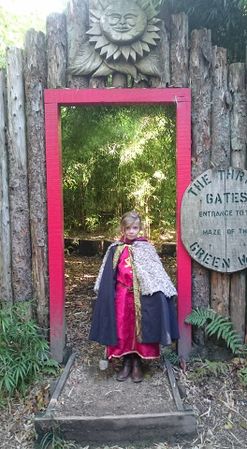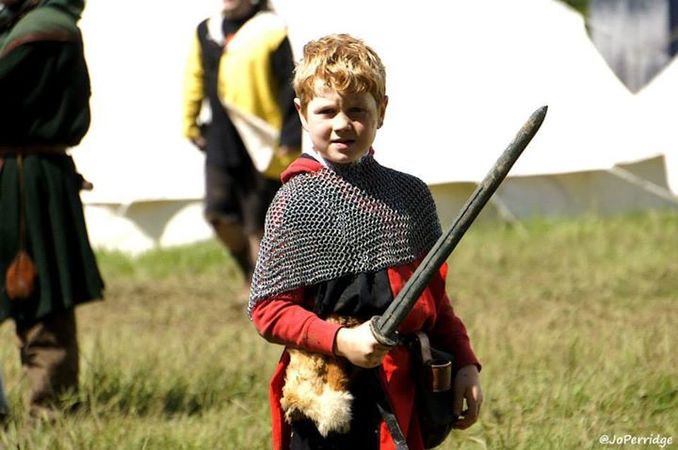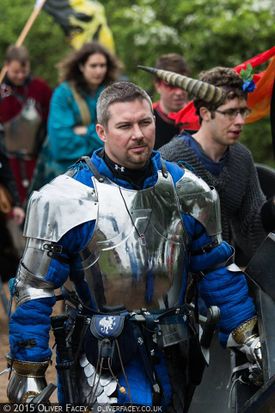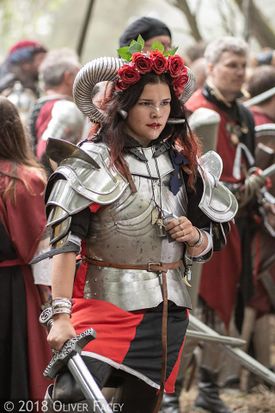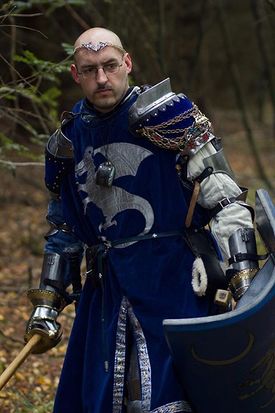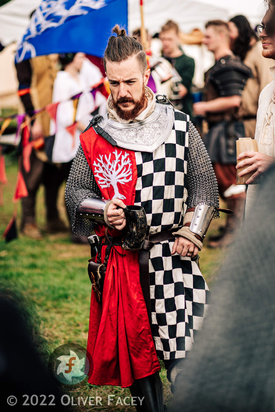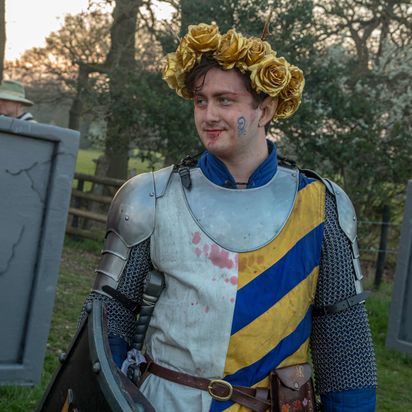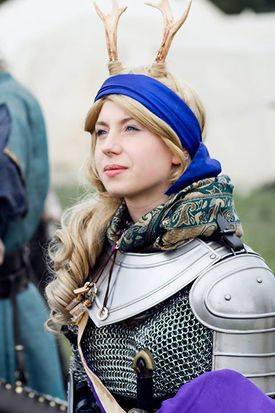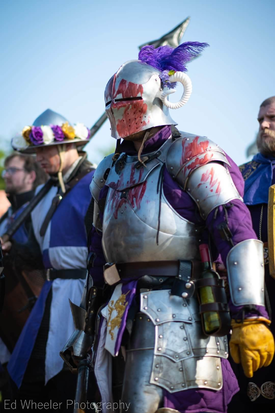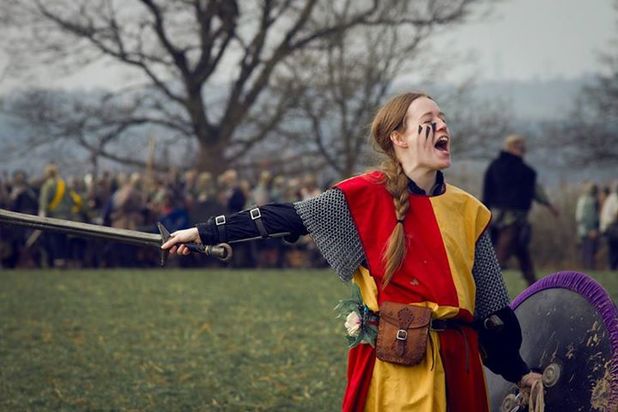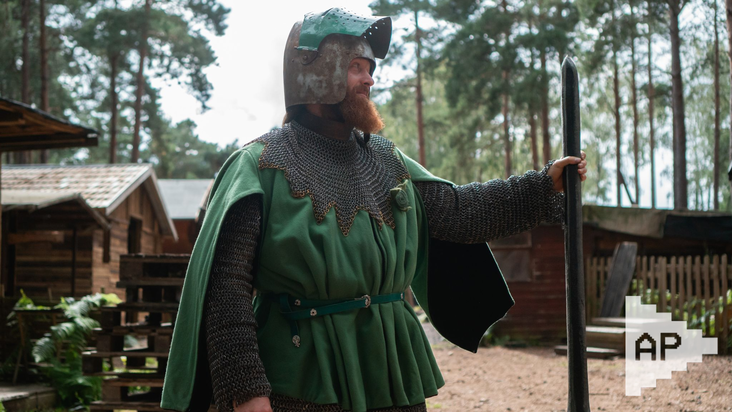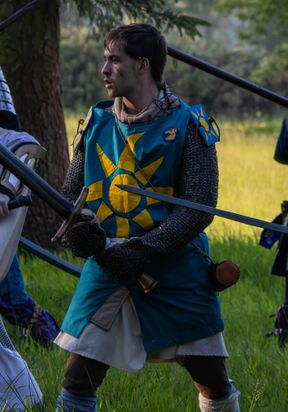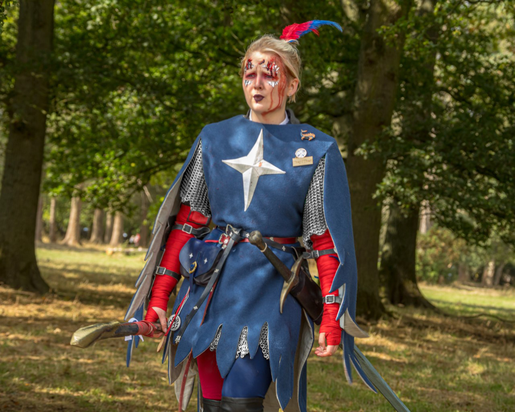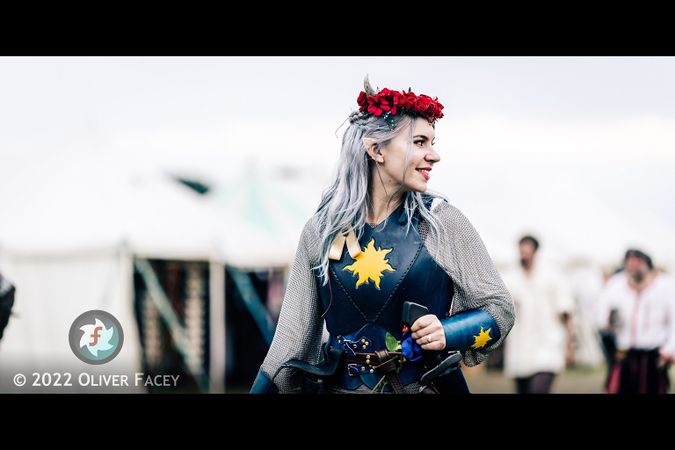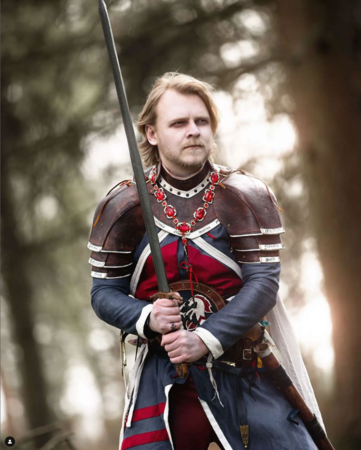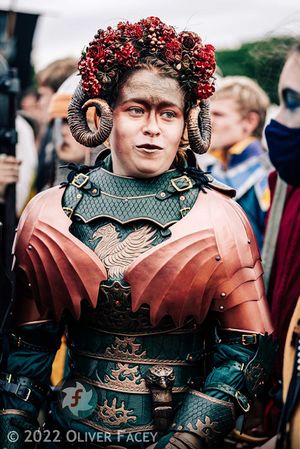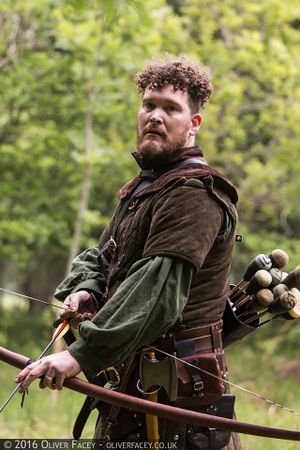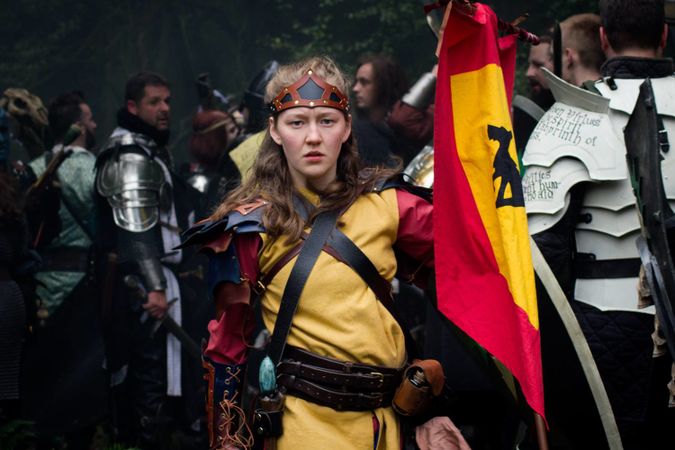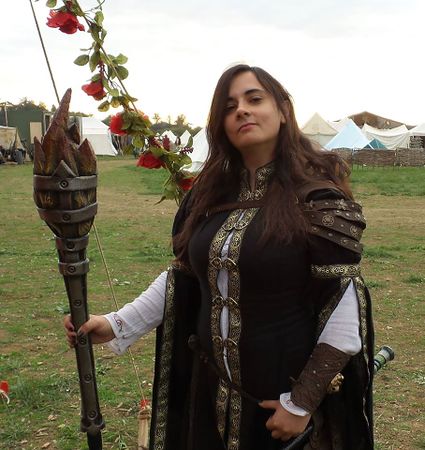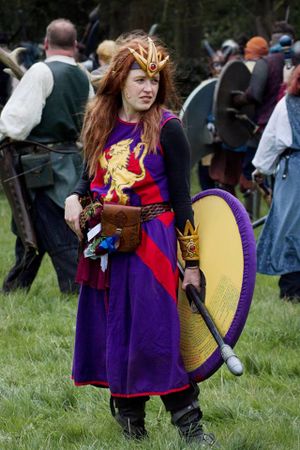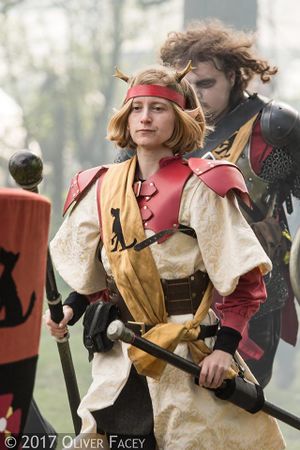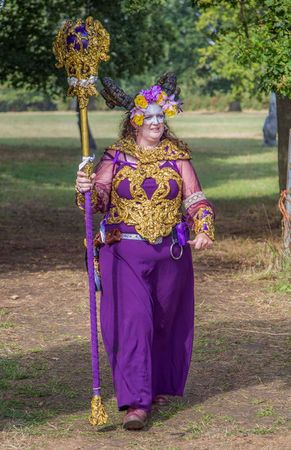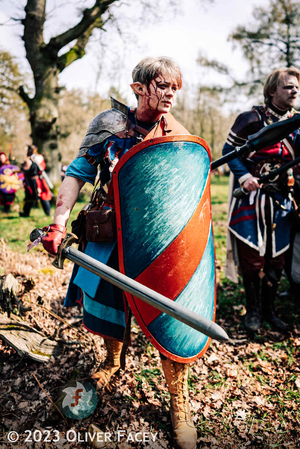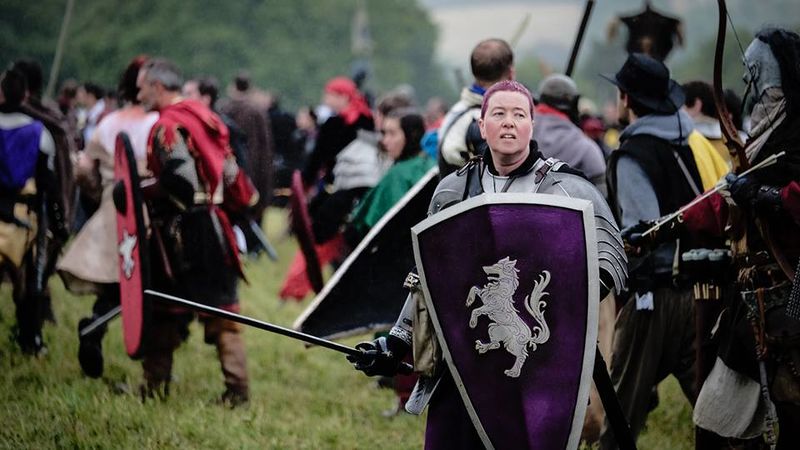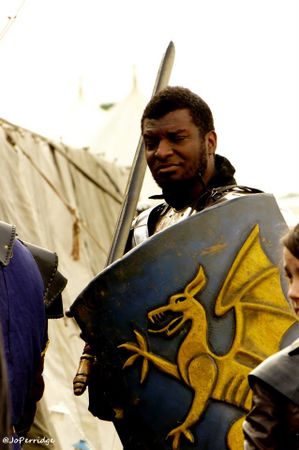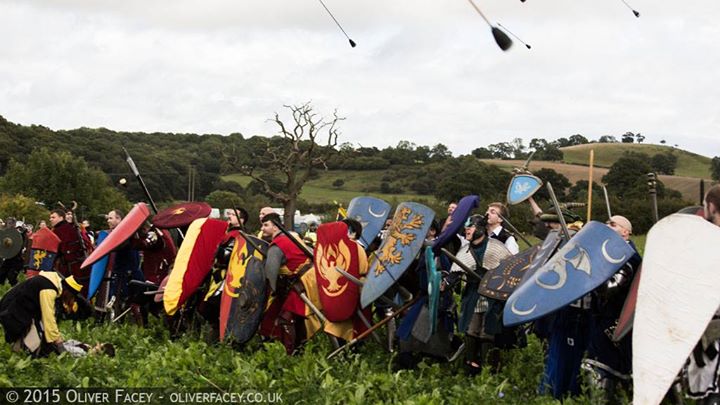Dawn look and feel
Wildwinter (talk | contribs) No edit summary |
m (Added links to inappropriate costume guidelines) |
||
| (409 intermediate revisions by 10 users not shown) | |||
| Line 1: | Line 1: | ||
== | {{CaptionedImage|file=Undying Glory.jpg|title=For glory!|align=left|width=550|caption=Sumptuous materials and vibrant colours secure Dawn's place as the land of [[glory]].}} | ||
==Overview== | |||
'''Arthurian, competitive, gleaming, glorious, romantic, Shakespearean, tragic, triumphant<br> | |||
in | [[Dawn]] is the land of valour; the classical images of gleaming plate, of brightly coloured banners and traditional heraldic devices provide the imagery for the nation. Where the Marches is gritty and down to earth, Dawn is the opposite in glowing primary colours. There is a sumptuous nature to the materials and tones used, idealistic in design instead of practical. The Arthurian, pre-raphaelite and neo-medievalism movements all provide strong themes and forms to the nation. | ||
There is a touch of tragic flaw to the people here though also, with elements of Shakespeare's tragedies and Tennyson's poems threaded through their lives, leaving shadow in contrast to all the glorious polished armour. | |||
''Also see [[Dawn costumes]] and [[Dawn culture and customs#Icons and Artistry|icons and artistry]].'' | |||
==Breakdown== | |||
<big>'''Influences</big><br> | |||
Idealised high medieval, Pre-raphaelite, Arthurian | |||
<big>'''Materials</big><br> | |||
Linen, velvet, silk, damask, brocade, fur linings and trim, butter-soft kid leather and suedes. | |||
<big>'''Colours</big><br> | |||
The palette is summer, a meadow in full bloom. It’s a myriad of bright, floral colours, accented with some darker jewel shades. Gold, emerald green, bright reds, clear sky blues set off against an occasional sumptuous black. Whatever the colour it should be vivid and lush but remain tasteful. | |||
the | |||
<big>'''Armour</big><br> | |||
Most knights wear the most flamboyant armour they can afford, often covered with a surcoat bearing their personal or house heraldry. Some will wear mail, some with plated reinforcement, and some a full harness. Knights-errant often wear less armour but everyone who is part of a noble house will sport their colours. | |||
High quality leather armour mimics the form of plate – breastplates, gorgets with articulated arms, vambraces etc may all be worn and often bear their owners’ heraldry as a form of rich decoration. Full length ‘coats’ of leather scale or plates may be worn alone or under more leather armour. | |||
– | |||
The armour is designed not only to protect in war but also to proclaim their glory and make their deeds all the more memorable. | |||
<big>'''Shields</big><br> | |||
Shields are highly popular in Dawn, as much for their decoration as their ability to protect. Heater shields are the favoured shape, decorated with personal or household devices. | |||
<big>'''Weapons</big><br> | |||
The archetypal Dawnish weapon is the medieval broadsword, but ornate warhammers, maces and axes are also used. Missile weapons are rare; archery is seen as a fitting contest of skill, rather than a glorious weapon of war. | |||
==Clothing== | |||
The classic dress for all genders is a long robe with full sleeves or houppelande. The cloth may be silk, velvet, brocade or fine wool and could be subtly patterned. They are often fur trimmed. These are generally worn over a long shirt, well cut trousers and high legged boots. Some Dawnish might choose to wear a dress or bliaut instead, with simple flowing lines and quite a low neck line, possibly revealing a chemise or shift below. Sleeves are again often extravagantly long. Houppelandes may be worn over a long shirt, well cut trousers and high boots. | |||
Headgear for everyone is extravagant, and it is definitely headgear rather than hats. Chaperons are often worn to impress, and the type of headdresses worn by Arthurian women are the stuff of legend and fantasy. Circlets and headbands are also popular for all whether made of gold or simple leather. | |||
gold or simple leather. | |||
Jewellery is exquisite - a jewelled dagger sheath, a filigreed necklace, a | Jewellery is exquisite - a jewelled dagger sheath, a filigreed necklace, a pair of combs, even the poorest will have a piece of treasured jewellery handed down. | ||
pair of combs, even the poorest will have a piece of treasured jewellery | |||
handed down. | |||
=== | ===Noble costume=== | ||
Noble costume should aim to be resplendent. The cut is simple - sleeves may be dagged but are not slashed or puffed - the fabrics are luxurious, the colours are rich and hems are lined with fur or ermine. Often costume is in house colours or embroidered with the house’s device. An emphasis on form over function can mark an outfit as particularly Dawnish. With dresses, cuts are simple, but the materials, the colours, the linings and the trims are rich, detailed and luxurious. Silk, velvet and brocade are ideal. Belts and pouches are best richly dyed leather suggesting wealth, with metal accents. | |||
<gallery heights=300 mode="packed"> | |||
GoldenNoble.png | |||
Clarice.jpg | |||
Noble in Blue is Dancing.png | |||
DawnNoble.jpg | |||
PurpleNoble.jpg | |||
Sceptre.jpg | |||
Cup and Crown.jpg | |||
Wounded Dawnish Changeling.png | |||
DawnSillyHats.jpg | |||
BlueNoble.png | |||
GoodSerBadSer.jpg | |||
Willam De Gauvain.jpg | |||
Fan of Dawn.png | |||
Celebration.jpg | |||
</gallery> | |||
===Yeofolk costume=== | |||
The costume of [[Yeofolk of Dawn|Dawnish Yeofolk]] echoes that of nobles, and while it often includes vibrant colours it is likely to be a little less ornamented and more practical then the resplendent clothing of their betters, but many are prosperous and most still dream of taking and passing a Test of Mettle. They mix easily with the nobility and richer yeofolk may look similar to nobles from an impoverished house. | |||
<gallery heights=300 mode="packed"> | |||
YeofolkAndChild.jpg | |||
ProsperousYeofolk.png | |||
FancyKatra.jpg | |||
GreenGoldMouse.jpg | |||
YeofolkLookingBlue.png | |||
VandaleRetainer.jpg | |||
</gallery> | |||
===Headwear=== | |||
Dawnish Headwear encompasses all the more elaborate medieval variety of hats, up to the start of the Renaissance. Headgear for all genders is extravagant, and it is definitely headgear rather than hats. Chaperons are often worn to impress, and the type of headdresses worn by Arthurian women are the stuff of legend - henins, crispinettes etc. | |||
<gallery heights=250 mode="packed"> | |||
SplendidHeadwear.png | |||
ResplendentChaperon.png | |||
NoblePointyHat.jpg | |||
Red Flower Crown Changeling.jpg | |||
MugWithHat.jpg | |||
</gallery> | |||
=== | ===Jewellery=== | ||
Jewellery is an important part of costume for all Dawnish nobility. Ideally it should be ornate and bejewelled to emphasize the status of the wearer. Jewellery is exquisite - a jewelled dagger sheath, a filigreed necklace, a pair of combs, even the poorest will have a piece of treasured jewellery handed down. Crowns and tiaras are common for earls and other nobles who wish to demonstrate their political power. Fillets and headbands are also popular for all whether made of a precious metal or simple leather. | |||
<gallery heights=300 mode="packed"> | |||
file:StatementPiece.jpg | |||
file:TwiceCrownedChangeling.jpg | |||
file:HoupeThereItIs.png | |||
file:Dawn Mugs.jpg | |||
file:WilliamDeGauvain.jpg | |||
</gallery> | |||
=== | ===Children=== | ||
Young children are an opportunity for noble houses to display their wealth and power. [[Squire|Squires]] are dressed in robes decorated with the house symbols. Older children, noble or yeofolk, want the most expensive clothes their parents can afford. Even when it is not ornamented, it is often strikingly coloured. | |||
<gallery heights=300 mode="packed"> | |||
file:Squire.jpg | |||
file:TestOfCitizenship.jpg | |||
file:YoungDawn.jpg | |||
file:Owain.jpg | |||
</gallery> | |||
=== | ==Armour== | ||
The | ===Plate=== | ||
The very wealthiest knights of Dawn possess a harness of plate, but it is more than just armour. The nation, house or personal symbol maybe etched, engraved or decorated on the armour. Alternatively a rich embroidered cloak could be thrown over the plate. A beautiful surcoat or jupon can be used to emphasise the knight’s regal nature . Individual pieces of plate are often worn over mail. Even without a surcoat, a noble can demonstrate their link to a house with a richly dyed padding worn under the harness. | |||
<gallery heights=275 mode="packed"> | |||
ArmouredEarl.jpg | |||
Battle Cambion.jpg | |||
DawnishSplendor.jpg | |||
ContemplativeKnight.png | |||
Plate and Flower Crown.jpg | |||
HeavyChangeling.jpg | |||
Bloodied Plate.png | |||
</gallery> | |||
===Mail=== | ===Mail=== | ||
Mail is | Mail is highly valued, either worn under plate or by itself. Ideally such armour should include a surcoat or a robe decorated with a house symbol, often a [[legendary beasts|fabulous beast]] like a chimera or a dragon. | ||
a surcoat or a robe decorated with a house symbol, often a fabulous beast like | <gallery heights=275 mode="packed"> | ||
QuestingYeoman.jpg | |||
KnightInGreen.png | |||
GreatswordErrant.jpg | |||
Aurum Walking.png | |||
</gallery> | |||
=== | ===Leather=== | ||
Leather armour is common in Dawn, and is often worn by | Leather armour is common in Dawn, and is often worn by [[Yeofolk of Dawn|yeofolk]] and [[knights-errant]]. It should range from simple protection to something designed to look as stunning as possible. | ||
should range from simple protection to something designed to look as stunning as possible. | <gallery heights=300 mode="packed"> | ||
Leather and Chain Knight-Errant.jpg | |||
LeatherDraughir.png | |||
Emerald Cambion.jpg | |||
YeomanArcher.jpg | |||
</gallery> | |||
=== | ===Mage Armour=== | ||
[[Weapons_%26_armour#Mage_Armour|Mage armour]], like other Dawnish armour, is often ornamented and may bear heraldic devices. | |||
<gallery heights=300 mode="packed"> | |||
file:Dawn War-Witch.jpg | |||
file:TatyannaOrzel.jpg | |||
Changeling Mage.jpg | |||
file:Dawn Witch.jpg | |||
Enchanting Areloe.jpg | |||
</gallery> | |||
===Shields=== | |||
Shields are highly popular in Dawn, as much for their decoration as their ability to protect. Heater shields are the favoured shape, decorated with personal or household devices. The traditional Dawnish shield is a heater or a kite shield. Whatever the shape, a shield is the perfect place for a Dawnish noble to display their personal arms or the insignia of their house. | |||
<gallery heights=300 mode="packed"> | |||
=== | ChampionsBastion.png | ||
DawnishHero.jpg | |||
DragonShield.jpg | |||
ShieldsVolley.jpg | |||
</gallery> | |||
== | |||
== | ==Inappropriate Costume== | ||
Whilst this look and feel page provides the ideal costume for the nation, it is important for players to familiarise themselves with the [[Costume|general costume rules]] for further guidelines, including those for [[Costume#Inappropriate_Costume|inappropriate costume]]. | |||
{{Dawn Links}} | |||
Latest revision as of 15:28, 15 April 2024
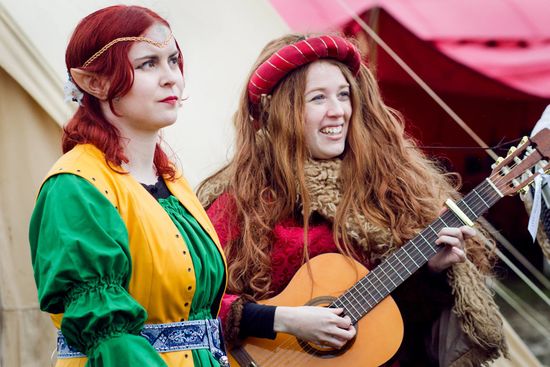
Overview
Arthurian, competitive, gleaming, glorious, romantic, Shakespearean, tragic, triumphant
Dawn is the land of valour; the classical images of gleaming plate, of brightly coloured banners and traditional heraldic devices provide the imagery for the nation. Where the Marches is gritty and down to earth, Dawn is the opposite in glowing primary colours. There is a sumptuous nature to the materials and tones used, idealistic in design instead of practical. The Arthurian, pre-raphaelite and neo-medievalism movements all provide strong themes and forms to the nation.
There is a touch of tragic flaw to the people here though also, with elements of Shakespeare's tragedies and Tennyson's poems threaded through their lives, leaving shadow in contrast to all the glorious polished armour.
Also see Dawn costumes and icons and artistry.
Breakdown
Influences
Idealised high medieval, Pre-raphaelite, Arthurian
Materials
Linen, velvet, silk, damask, brocade, fur linings and trim, butter-soft kid leather and suedes.
Colours
The palette is summer, a meadow in full bloom. It’s a myriad of bright, floral colours, accented with some darker jewel shades. Gold, emerald green, bright reds, clear sky blues set off against an occasional sumptuous black. Whatever the colour it should be vivid and lush but remain tasteful.
Armour
Most knights wear the most flamboyant armour they can afford, often covered with a surcoat bearing their personal or house heraldry. Some will wear mail, some with plated reinforcement, and some a full harness. Knights-errant often wear less armour but everyone who is part of a noble house will sport their colours.
High quality leather armour mimics the form of plate – breastplates, gorgets with articulated arms, vambraces etc may all be worn and often bear their owners’ heraldry as a form of rich decoration. Full length ‘coats’ of leather scale or plates may be worn alone or under more leather armour.
The armour is designed not only to protect in war but also to proclaim their glory and make their deeds all the more memorable.
Shields
Shields are highly popular in Dawn, as much for their decoration as their ability to protect. Heater shields are the favoured shape, decorated with personal or household devices.
Weapons
The archetypal Dawnish weapon is the medieval broadsword, but ornate warhammers, maces and axes are also used. Missile weapons are rare; archery is seen as a fitting contest of skill, rather than a glorious weapon of war.
Clothing
The classic dress for all genders is a long robe with full sleeves or houppelande. The cloth may be silk, velvet, brocade or fine wool and could be subtly patterned. They are often fur trimmed. These are generally worn over a long shirt, well cut trousers and high legged boots. Some Dawnish might choose to wear a dress or bliaut instead, with simple flowing lines and quite a low neck line, possibly revealing a chemise or shift below. Sleeves are again often extravagantly long. Houppelandes may be worn over a long shirt, well cut trousers and high boots.
Headgear for everyone is extravagant, and it is definitely headgear rather than hats. Chaperons are often worn to impress, and the type of headdresses worn by Arthurian women are the stuff of legend and fantasy. Circlets and headbands are also popular for all whether made of gold or simple leather.
Jewellery is exquisite - a jewelled dagger sheath, a filigreed necklace, a pair of combs, even the poorest will have a piece of treasured jewellery handed down.
Noble costume
Noble costume should aim to be resplendent. The cut is simple - sleeves may be dagged but are not slashed or puffed - the fabrics are luxurious, the colours are rich and hems are lined with fur or ermine. Often costume is in house colours or embroidered with the house’s device. An emphasis on form over function can mark an outfit as particularly Dawnish. With dresses, cuts are simple, but the materials, the colours, the linings and the trims are rich, detailed and luxurious. Silk, velvet and brocade are ideal. Belts and pouches are best richly dyed leather suggesting wealth, with metal accents.
Yeofolk costume
The costume of Dawnish Yeofolk echoes that of nobles, and while it often includes vibrant colours it is likely to be a little less ornamented and more practical then the resplendent clothing of their betters, but many are prosperous and most still dream of taking and passing a Test of Mettle. They mix easily with the nobility and richer yeofolk may look similar to nobles from an impoverished house.
Headwear
Dawnish Headwear encompasses all the more elaborate medieval variety of hats, up to the start of the Renaissance. Headgear for all genders is extravagant, and it is definitely headgear rather than hats. Chaperons are often worn to impress, and the type of headdresses worn by Arthurian women are the stuff of legend - henins, crispinettes etc.
Jewellery
Jewellery is an important part of costume for all Dawnish nobility. Ideally it should be ornate and bejewelled to emphasize the status of the wearer. Jewellery is exquisite - a jewelled dagger sheath, a filigreed necklace, a pair of combs, even the poorest will have a piece of treasured jewellery handed down. Crowns and tiaras are common for earls and other nobles who wish to demonstrate their political power. Fillets and headbands are also popular for all whether made of a precious metal or simple leather.
Children
Young children are an opportunity for noble houses to display their wealth and power. Squires are dressed in robes decorated with the house symbols. Older children, noble or yeofolk, want the most expensive clothes their parents can afford. Even when it is not ornamented, it is often strikingly coloured.
Armour
Plate
The very wealthiest knights of Dawn possess a harness of plate, but it is more than just armour. The nation, house or personal symbol maybe etched, engraved or decorated on the armour. Alternatively a rich embroidered cloak could be thrown over the plate. A beautiful surcoat or jupon can be used to emphasise the knight’s regal nature . Individual pieces of plate are often worn over mail. Even without a surcoat, a noble can demonstrate their link to a house with a richly dyed padding worn under the harness.
Mail is highly valued, either worn under plate or by itself. Ideally such armour should include a surcoat or a robe decorated with a house symbol, often a fabulous beast like a chimera or a dragon.
Leather
Leather armour is common in Dawn, and is often worn by yeofolk and knights-errant. It should range from simple protection to something designed to look as stunning as possible.
Mage Armour
Mage armour, like other Dawnish armour, is often ornamented and may bear heraldic devices.
Shields
Shields are highly popular in Dawn, as much for their decoration as their ability to protect. Heater shields are the favoured shape, decorated with personal or household devices. The traditional Dawnish shield is a heater or a kite shield. Whatever the shape, a shield is the perfect place for a Dawnish noble to display their personal arms or the insignia of their house.
Inappropriate Costume
Whilst this look and feel page provides the ideal costume for the nation, it is important for players to familiarise themselves with the general costume rules for further guidelines, including those for inappropriate costume.
Further Reading
Core Brief
Additional Information
